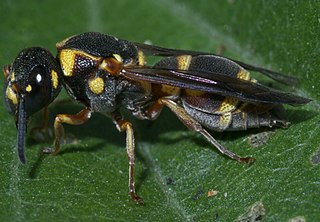
Potter wasps, the Eumeninae, are a cosmopolitan wasp group presently treated as a subfamily of Vespidae, but sometimes recognized in the past as a separate family, Eumenidae.

Cephalastor is a small neotropical genus of potter wasps currently containing 14 species.
Brachymenes is a small neotropical genus of potter wasps currently containing two species, the primarily Andean species B. wagnerianus and the lowland species B. dyscherus.
Gamma is a small neotropical, primarily northern Andean genus of potter wasps currently containing 6 recognized species.

Monobia is a primarily neotropical genus of medium-sized to large potter wasps occurring from the United States to Argentina. This genus is very closely related to the genus Montezumia. It contains the following species:
Pseudacaromenes is a small Neotropical genus of large potter wasps containing two known species: the Amazon basin endemic Pseudacaromenes alfkenii and the widespread Pseudacaromenes johnsoni.
Omicron is a quite diverse Neotropical genus of small potter wasps.
Stenosigma is a small Neotropical genus of potter wasps.
Pachymenes is a small but widely distributed Neotropical genus of potter wasps, it has been proposed that another Neotropical genus, Santamenes, be merged into Pachymenes.

Delta is an Old World genus of potter wasps with species predominantly distributed through tropical Africa and Asia. Some species are present in the Palearctic region, and a few have been introduced in the Nearctic and Neotropical regions. The members of this genus have a long metasomal petiole, like members of the genera Eumenes and Zeta.

Stenodynerus is a rather large genus of potter wasps whose distribution spans the Nearctic, Palearctic, Oriental and Neotropical regions. Most of its species lack a transverse carina on the first metasomal tergum. A pair of medial pits on the anterior face of the pronotum and the expansion of the tegulae put this genus close to genera as Parancistrocerus, Hypancistrocerus and Eustenancistrocerus.
Knemodynerus is a genus of potter wasps distributed through the Palearctic, Afrotropical, Indomalayan and Australasian regions. The species currently classified in the genus are:
Orientalicesa is a small Indomalayan genus of potter wasps.
Stroudia is an Afrotropical genus of potter wasps.
Eumenidiopsis is an afrotropical genus of Afrotropical potter wasps with eight known species, which are set out below:
Micreumenes is an Afrotropical genus of potter wasps with 30 described species.
Paravespa is an Afrotropical and Palearctic genus of potter wasps.
Rhynchalastor is a moderately large afrotropical genus of potter wasps with 25 species currently known. Some authorities expand the genus to include species otherwise classified under related genera such as Stenodynerus
Jucancistrocerus is a Palearctic genus of potter wasps. The currently species assigned to Jucancistrocerus are:
Antonio Giordani Soika was an Italian entomologist, ecologist and director of the Civic Museum of Natural History of Venice. He had a long career in which he worked on various groups of insects but much of his work was on the Hymenoptera. He made great contributions to the knowledge of Neotropical wasps, especially potter wasps for which he produced many taxonomic keys and also monographs on the systematics of the wasp family Vespidae.




